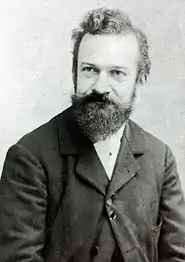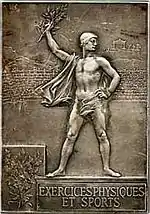
Frédéric-Charles Victor de Vernon (17 November 1858, in Paris – 28 October 1912 in Paris), was a sculptor and engraver of French medals.[1]
Biography
He was educated at the École des beaux-arts where his teachers were Jules Cavelier, Jules-Clément Chaplain, and Émile Tasset.
In 1881, he won second great Prix de Rome and in 1887 the first grand prix of Rome, after which he spent three years at the villa Médicis.[2]

In 1900, he designed the official medals for the 1900 Summer Olympics held in Paris.[3] These medals are unique in being the only Olympic medals to be rectangular rather than the traditional circular design. Member of the Société des artistes français since 1896, he was elected member of the Académie des beaux-arts in 1909.[4]
His son Jean de Vernon (1897–1975), was likewise an engraver, medallist and a French sculptor.
A prize for engraving bears his name and that of his son Jean: "Prix Frédéric et Jean de Vernon – Gravure".
Works

.jpg.webp)
.jpg.webp)
Bibliography
- E. Bénézit, Dictionnaire des peintres, sculpteurs, dessinateurs et graveurs. 1976. Tome 10, page 469.
References
- ↑ "Frédéric de Vernon (1858–1912)" (in French). BnF (Bibliothèque nationale de France). Retrieved 12 November 2017.
- ↑ La Médaille en France de Ponscarme à la fin de la Belle Époque, Hôtel de la Monnaie, juin-septembre 1967
- ↑ "PARIS 1900 THE MEDALS". International Olympic Committee. International Olympic Committee. Retrieved 12 August 2021.
- ↑ Catalogue général illustré des Éditions de la Monnaie de Paris, sans date (1985)
External links
 Media related to Frédéric-Charles Victor de Vernon at Wikimedia Commons
Media related to Frédéric-Charles Victor de Vernon at Wikimedia Commons- Some of his works
